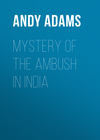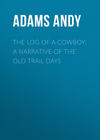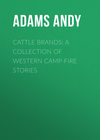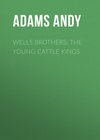Kitabı oku: «Mystery of the Ambush in India», sayfa 2
III
The Rajah’s Ruby
By the time the basket carriers had turned a few corners, Biff was not so sure that he would rejoin his companions as soon as he expected. The lazily moving pair suddenly stepped up their pace and the narrow, poorly paved streets looked so much alike that Biff had no idea where they were leading him.
The streets were flanked by chawls or native houses that were scarcely more than hovels. From the suspicious glances that Biff received, and from the way the buildings encroached upon the narrow alleys, he felt as though a whole sea of humanity was closing in upon him. He realized that he would need a compass to find his way back. There was no telling by the sun, which was out of sight even over the low roofs, although the day was becoming so hot that Biff wished he were back in a rickshaw instead of footing it through these dismal, dirty streets.
Then they reached a better section, where the buildings were higher, with occasional shop fronts. There, the basket bearers slackened pace and turned into a passage beneath an archway that bore the sign:
D. CHAND & BROS
Import – Export
Warehouse
Biff followed cautiously and saw the two men cross a little courtyard and continue through another archway well beyond. There they disappeared from view but only long enough to set down the basket, because one of them returned to the inner arch and closed a big metal gate behind him. He then went to rejoin his companion.
By then, Biff was moving into the courtyard himself. He edged over to one side and gained a look through the inner arch. Beyond the closed gate he saw what appeared to be a large storeroom, for there were many crates, boxes, and other bulky objects stacked there. From his angle, Biff could see nothing of the two men, so he moved cautiously toward the inner arch, hoping to get a closer and more direct view.
At that moment, a clang sounded behind him, and Biff turned to see that another gate had closed in the outer arch. A tall man in baggy white clothes had stepped in from the street and was now locking the gate behind him. Biff was trapped in the open space between the archways. He looked quickly for an outlet, and saw one on the other side of the courtyard, in the form of an open doorway.
Biff hurried in that direction, only to stop short as a man appeared in the doorway to meet him with a polite, welcoming bow. The man was dressed in European clothes, but his broad, bland face, with fixed smile and bushy eyebrows above his large-rimmed glasses, was definitely Asiatic. So was his cool, even-toned pronouncement:
“I am Diwan Chand. I have been expecting you. Come in.”
Then, as Biff hesitated, glancing back at the white-garbed Hindu, who was coming from the outer gate, Diwan Chand added a further introduction:
“This is Nathu, my special watchman. I thought it best to have him lock the gate, so we cannot be disturbed. He will wait here until we return.”
Chand said nothing about the pair who had gone through the inner archway with the basket. Biff followed the bland merchant through a room equipped with a long row of vacant desks, like an old-fashioned counting house.
“Our clerks work here,” explained Chand, “but they have all gone out to lunch, so no one will know of your visit.”
Whether that was good or bad, Biff wasn’t sure. He felt a nervous tingling that seemed an instinctive warning of some close danger; yet it might be that all these precautions were for his benefit.
This seemed doubly so when they reached Chand’s quiet private office at the rear of the long counting room. There, the merchant closed the door, gestured Biff to a chair, and opened a small safe that was cunningly concealed in the elaborately carved woodwork of the wall.
“You received your father’s message,” commented Mr. Chand, “and now I have something for you to take to him. This.”
Biff gasped at the object Mr. Chand placed on the table before him. There, in a small case lined with white velvet, gleamed the largest and most magnificent gem that Biff had ever seen. It was a blood-red ruby, with a touch of purple that gave it a glow like living fire, even in the subdued light of the office. In his study of mineralogy, Biff had viewed many fine stones, but never one that even approached this ruby.
“A padmaraga,” Mr. Chand said. “A true Brahmin ruby, not to be confused with those of lesser caste. Whoever carries such a gem as this one can live in perfect safety in the midst of many enemies, totally without fear.”
At first, Biff thought that Mr. Chand was simply repeating some Hindu legend concerning rubies, but he soon saw that the merchant’s steady smile had become very serious.
“For this I can vouch,” Mr. Chand continued. “The Light of the Lama, as this ruby is known, brought good fortune to the descendants of the rajah who originally owned it. While I have been its custodian, I, too, have prospered. There has been no trouble here, despite riots and disturbances in other parts of Calcutta, in fact, throughout India.”
Mr. Chand picked up the squarish jewel case and started to place it in a chamois bag, as he added:
“And now good fortune goes with you. They say that even the power of invisibility is granted to those who hold this gem. Perhaps that is why danger has passed me by.”
“But in that case,” Biff asked frankly, “why are you giving it to me? Shouldn’t you keep it for yourself?”
“It is my duty to pass it along,” replied Mr. Chand solemnly, “and besides, I have noticed that the Light is losing some of its fire, which is a bad sign. See for yourself!”
He moved the ruby closer to Biff, who saw now that the gem was in a simple golden setting; but more important, just as Mr. Chand said, its sparkle had dwindled. Then, as Biff himself held the jewel, its wine-red depth kindled with new flame, so suddenly that Biff caught his breath.
“A good sign!” exclaimed Mr. Chand, closing the little case and thrusting it into the bag. “That proves it is in the hands where it belongs!” He pressed it into Biff’s hands as he spoke. “So guard it well” – he paused and his fixed smile became whimsical for once – “or I should say, it will guard you well. We have just seen proof of that.”
Evidently, Mr. Chand referred to the ruby’s sudden glow, which was quite puzzling to Biff. But something else puzzled him still more.
“Why must I take this ruby to my father?”
“He will tell you when you see him,” replied Mr. Chand. “The less I say, the better, now that I no longer have the ruby to protect me.”
“And where will I find my father now?”
“In New Delhi. Go there, but do not contact his company except to ask for him by telephone. If he is not there, go to the United States Embassy, but be careful even then, as spies are watching everywhere. Trust only your father’s voice as you did when you received the taped message that I sent you.”
Biff nodded, recognizing the wisdom of all that. Then, thoughtfully, he remarked:
“In that message, my father said I would meet a man that he and I could both trust. I am sure he meant you, Mr. Chand.”
If the merchant had beamed at the compliment, Biff might have been suspicious, for he still felt the odd sensation of some impending danger. But Mr. Chand was modest.
“You can trust me,” he said simply, “but your father meant another man, Barma Shah. He was the contact who brought us together. I had hoped that he would be here to meet you and go with you now, but he is probably being watched.”
“By the same spies you mentioned, Mr. Chand?” Biff inquired.
“Yes. Barma Shah told me he would stay away if danger threatened here. That was a month ago and shortly afterward, new riots broke out in Calcutta. Some were rather close by, the nearest that they have been. Naturally, Barma Shah did not come that day. He has stayed away since – and wisely – so I sent word to you myself, as was arranged for such a situation.”
Above Mr. Chand’s quiet voice, Biff thought he heard a rising murmur, much like the approach of the tidal bore along the Hooghly. Whether or not it was his imagination, he felt more closed in than ever.
“The day of the riots,” Mr. Chand went on, “I looked at the Light of the Lama and saw it had clouded. I was afraid, not for myself, but for Barma Shah. I was glad when he did not come here – ”
The murmur was louder now, no longer like wave beats, but more a human babble, with occasional muffled shouts. Mr. Chand heard them, too, for he raised his hand and exclaimed: “Listen!” Timed to the action came a sudden pounding at the office door and the excited voice of Nathu, the watchman:
“Master! There is danger! Another riot has started, outside our very gate!”
As Chand unlocked the office door and opened it, the babble rose to a bedlam of howls, shrieks, and the clang of metal as the mob battered at the big gate. At Chand’s mention of the ruby, Biff had thrust his hand into his pocket to see if he still had the chamois bag that he had placed there. It was safe, and as Biff clenched it tensely, his palm seemed to burn as though the gem were actually glowing through its wrappings.
There was a huge crash as the metal gate collapsed and now, through the barred windows of the counting room, Biff could see the milling figures of the native rioters as they flooded the courtyard, swinging clubs, slashing with knives, and hurling rocks at one another. Some of those missiles smashed the glass in the barred windows, adding to the crowd’s glee, for they were eager to destroy property along with lives.
Mr. Chand showed surprising speed as he whisked Biff back into the little office and through a door in the opposite wall, at the same time saying excitedly, “Go through the godown! It is your only way!”
Biff thought “godown” meant some steps, but instead, Mr. Chand was referring to the storeroom. As Biff started off among the crates, there was another clang from the courtyard, where the rioters were smashing at the inner gate leading into the storage room itself.
“Not that way!” called Mr. Chand. “At the back, you will find another darwaza– another gate! Turn left on the back street until you reach the chowk– the market place! You will be safe there.”
Mr. Chand turned back into his office to help Nathu try to stem the attack, and Biff shoved his way among the crates, clambering over boxes, until he reached the rear exit that Mr. Chand had mentioned, but too late. Already, the back street teemed with rioters. Leering faces turned Biff’s way, and eager fingers pointed at him through the bars of the rear gate.
Then hands were bashing the gate itself as others threw stones through the grillwork. Biff dodged back among the crates, realizing hopelessly that he was caught between two fires. A great crash told that the gate from the courtyard had given way; and an echoing clang from the other direction signified that the rear gate had met the same fate.
What Biff’s own fate would be, the next few moments would tell. Grimly, he found himself gripping the chamois bag in his pocket, wondering if the Light of the Lama could save him now. As if in answer, something plucked his shoulder and Biff turned quickly, bringing both fists up to fight off the first of a hundred enemies.
Instead, he found himself looking into the face of Chandra, the Indian boy who had vanished from the basket back at the New India Bazaar. Above the babble of the rioters came Chandra’s words:
“Quick! Come with me – this way!”
IV
Biff Vanishes
Escape from the frenzied mob seemed impossible, but at least Chandra was making a try as he pushed Biff toward a deep corner of the big storeroom, the only direction in which the invaders had not yet spread. But there was no door, no outlet, nothing except a solid stone wall beyond the last lot of crates.
Those offered no good hiding place, because the rioters already were overturning or yanking open chests and boxes which blocked them, while they kept up an excited shout, “Farangi! Farangi!”
That was one word that Biff knew. It meant “European” – which in his case could be translated as “American” – and it signified that they were definitely after Biff, though probably they would attack any Farangi that they encountered. And now, Biff and Chandra were practically in the corner, with no way to turn, except one, which looked like the worst trap of all.
Just ahead stood a tall, rather bulky cabinet shaped in the form of a pagoda, with half a dozen sides and a pair of front doors that were partly open. Quickly, Chandra thrust Biff inside and pushed him to the back, saying, “In there – keep quiet – do not move!” Then he pressed an inner door shut, and Biff found himself alone in pitch darkness, clamped in a space so tight that Chandra’s admonition not to move was quite unnecessary.
Chandra was gone by then, dodging off among the crates, perhaps to save his own sleek hide at the expense of Biff’s. For Biff, realizing now that he was really boxed, was beginning to regret that he had trusted the Indian youth so completely. Chandra, a native himself, probably had friends among the mob. Maybe he had even told them that he would lure Biff here.
Until now, Biff had had a chance either for fight or flight. Those were both gone, and if he didn’t suffocate in this bandbox, he would probably be yanked out and torn apart before he could even make a move. He was so tightly jammed, he couldn’t even reach into his pocket and find the ruby, which he felt was the real cause of his misfortune, despite the soft talk Diwan Chand had given him.
Even now, Biff heard voices: “Farangi – we find him – look there…” And he could hear crates being turned over close by. Next, the shouters were clambering in and out of the cabinet itself, for Biff could feel it shake and the hoarse, snarly voices were almost at his elbow. They were even pulling the pagoda out from the wall, for its platform was set on wheels; and they were literally spinning it about, with Biff still inside it, yet for some reason, they passed by him in the blackness.
More shouts, louder crashes were suddenly punctuated by pistol shots, leading to a last round of tumult that soon died. Biff heard receding footsteps; then came a deadly silence, which was even worse. Biff felt totally helpless and abandoned, unable to move, afraid even to call for help. He was drenched in perspiration, and why he hadn’t suffocated or been found he couldn’t understand, until a sharp click interrupted his numbed thoughts.
Biff lurched forward, found the front doors and stepped shakily from the pagoda cabinet to find one person in the dim light of the warehouse waiting, grinning, to receive him. That was Chandra.
Briefly, the Indian boy explained things.
“They took a good look for you, all right,” he said. “Some of them did, anyway, while the rest kept fighting each other. They looked a lot, but they didn’t find you – or me.”
“But where did you go, Chandra?”
“Back in basket that brought me here,” replied Chandra, widening his grin. He reached past a crate, pulled out the basket, squatted in it and suddenly squirmed from sight, as if the basket were bottomless. Biff looked in and was amazed to see nothing except a heap of old cloth.
Then, the heap stirred, and Chandra twisted into view from the basket’s bulging sides where he had artfully coiled his thin, agile body.
“So that’s how you vanished!” exclaimed Biff. “Why, you were still in the basket when the two men took it away!”
“How else could I get here so quick?” retorted Chandra. “They are friends of Jinnah Jad, who show up with basket at the right time. This godown is where Jinnah Jad keeps all his tricks, like the new pagoda he built to make people vanish. So I put you there.”
“And I was thinking – ”
Biff cut himself short, but Chandra picked him up.
“You think maybe the big ruby made you invisible,” declared Chandra, “as it is supposed to do. But no, it was the pagoda trick. It hid you, the basket hid me.”
Biff was cooler now, and he felt an actual shudder as he looked around at the wreckage and saw some silent human figures lying near the gate to the courtyard. Otherwise, the warehouse was deserted, except for Biff and Chandra.
“But where did they all go, Chandra?” Biff asked.
“You heard shooting?” returned Chandra. “That was the police. They came to help Diwan Chand. Lucky they didn’t use tear gas, which they do a lot. We would have gotten it, too.”
Chandra was looking around at the broken boxes. He saw one that interested him and beckoned Biff that way.
“We must get out before police come back and ask us to be witnesses,” declared Chandra. “But the people who are after the ruby will be watching for you. So you must wear other clothes – like these.”
Chandra was picking some native garments from those that had been dumped from an overturned chest. Studying Biff, Chandra noted the deep tan that Biff had acquired during his long voyage on the Northern Star.
“Your face is dark enough,” decided Chandra, “but your light hair will have to be hidden. So we will make you into a Sikh. A Sikh always wears a turban. That will fool everyone.”
Soon, Biff was attired in a costume that made him feel top-heavy. It consisted of shorts, shirt, and jacket, and a huge turban, which completely covered Biff’s ears as well as his head, after Chandra helped him wrap it. They bundled up Biff’s clothes along with some other garments and went out by the rear gate.
It was fortunate that both were in native garb, because Biff could sense that eyes were watching them as they followed the street to the market place. Chandra knew it too, for he said, “Don’t look around. They will suspect us if you do.”
There were natives in the market place, gathered in little clusters, discussing the recent riot. They glanced at the boys as they passed, but that was all. Chandra gave a pleased chuckle, then added cautiously, “It looks good now, but still we play it safe. We go the long way, past the thana.”
By thana, Chandra meant police headquarters, a place that suspicious characters would avoid. After passing it, the boys were satisfied that they were not being followed, so they doubled back to the New India Bazaar, where they saw Li and Kamuka studying the passersby from the doorway of a sporting goods shop.
It was Biff’s move now. He eased up to Li, tapped him on the shoulder, and said, “Salaam, Sahib.” Li turned and blinked puzzled at the face beneath the turban until Biff could no longer restrain a grin.
“Biff!” exclaimed Li. “But where – and why – ”
“We can’t talk here,” interposed Biff. “Meet me around the corner and bring Kamuka.”
Chandra was with Biff when the other boys arrived. After introducing the Indian youth, Biff said:
“I must go to New Delhi. If Chandra can go with me, it is up to him to decide who can accompany us.”
“I can go,” Chandra assured him, “and Kamuka, too. But not Li.” He turned to the Hawaiian youth. “Too many people saw you with Biff while you were watching Jinnah Jad make jadoo. You might be recognized, one because of the other.”
Before Li could even show the disappointment that he felt, Biff softened the situation.
“Somebody will have to go up to Darjeeling,” he reminded his friend, “to tell the family where I’ve gone. Canceling those extra plane reservations and handling our luggage is a tough job, too. It looks like you’re elected, Li.”
Li not only was elected; he did his job well. He went to the Grand Hotel and returned by taxi, rejoining the group at a restaurant that Chandra had specified. Li had canceled the air reservations without difficulty; he had brought hiking packs for Biff and Kamuka, and he had arranged for shipment of the excess baggage.
After a substantial meal, Li returned to the hotel by cab, to catch the Darjeeling plane. The other boys boarded a big bus for Howrah, across the river. Biff and Kamuka looked down from the tremendous cantilever span and viewed the muddy Hooghly, hoping to spot the Northern Star moored in the dim distance. They were talking about it – in English, unfortunately – when Chandra hissed for silence.
They realized then that they were an odd group as it was – too odd to be using English as a common language. Biff, whose features didn’t properly match his Sikh’s costume; Kamuka, who might have come from an upcountry tribe, but was wearing European clothes; Chandra, who with his dhoti and jacket, looked like a jadoo wallah’s boy, which was exactly what he was, and therefore the most outlandish of the trio.
In short, they were attracting too much attention. Biff and Kamuka promptly subsided. Biff, particularly, felt that he should show some dignity, so he did, by looking squarely at the other passengers, until he caught the eye of a distinguished-looking man across the aisle.
The man had a large beard and a huge turban, which marked him as a Sikh, and a genuine one. He was studying Biff with sharp eyes that continued their piercing probe until the bus reached Howrah Station. Then, as they were stepping from the bus, the bearded Sikh suddenly spoke to Biff in what was their own common language, except that Biff couldn’t understand a word of it.
All that saved Biff was a surge of the crowd, with people pushing one way, then another, cutting him off from the bearded Sikh. Next, Biff was on the outskirts of the milling throng, and Chandra was yanking him away, along with Kamuka.
“Thanks, Chandra!” Biff gasped. “If you hadn’t dragged me out of that jam, the Sikh would have known I was a fake – ”
“That wasn’t why!” returned Chandra. “That wouldn’t have bothered us. Maybe you’re a fake, but he’s a bigger one. I saw his beard close enough to know.”
Biff looked back and saw that Chandra was right. Caught in the crowd, the man with the big turban wasn’t trying to follow the three boys; in fact, he couldn’t even see them. The reason was that his false beard had been pulled up over his eyes, and he was madly trying to straighten it.
Hand in his pocket, Biff was gripping the packet that he had transferred from his own clothes, wondering if the Light of the Lama again had saved him from an enemy!







